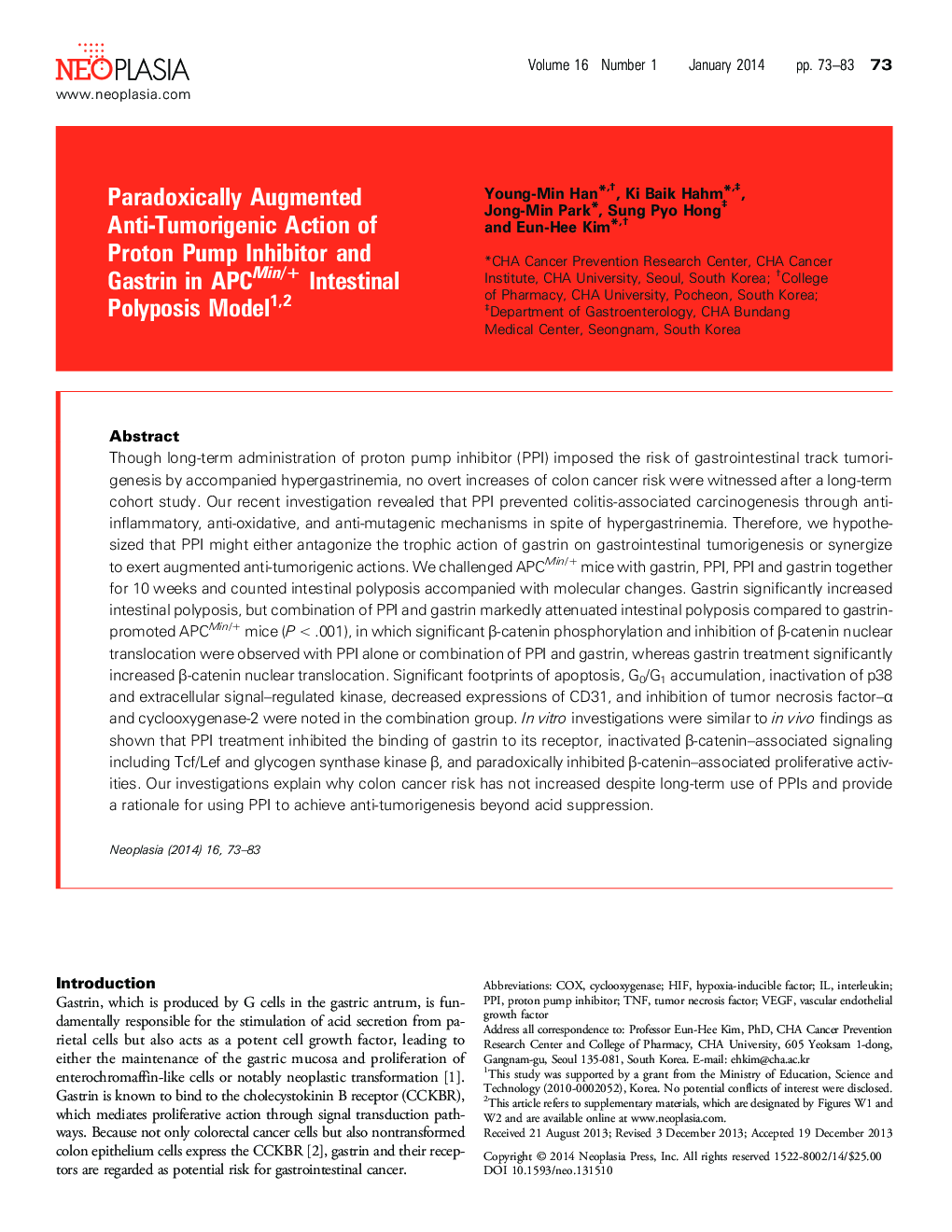| کد مقاله | کد نشریه | سال انتشار | مقاله انگلیسی | نسخه تمام متن |
|---|---|---|---|---|
| 2151282 | 1089978 | 2014 | 13 صفحه PDF | دانلود رایگان |
عنوان انگلیسی مقاله ISI
Paradoxically Augmented Anti-Tumorigenic Action of Proton Pump Inhibitor and Gastrin in APCMin/+ Intestinal Polyposis Model1
دانلود مقاله + سفارش ترجمه
دانلود مقاله ISI انگلیسی
رایگان برای ایرانیان
کلمات کلیدی
COXPPIHIFTNFcyclooxygenase - آنزیم سیکلواکسیژنازinterleukin - اینترلوکینHypoxia-inducible factor - فاکتور القاء کننده هیپوکسیVascular endothelial growth factor - فاکتور رشد اندوتلیال عروقیVascular Endothelial Growth Factor (VEGF) - فاکتور رشد اندوتلیال عروقی (VEGF)tumor necrosis factor - فاکتور نکروز تومورProton pump inhibitor - مهار کننده پمپ پروتون
موضوعات مرتبط
علوم زیستی و بیوفناوری
بیوشیمی، ژنتیک و زیست شناسی مولکولی
تحقیقات سرطان
پیش نمایش صفحه اول مقاله

چکیده انگلیسی
Though long-term administration of proton pump inhibitor (PPI) imposed the risk of gastrointestinal track tumorigenesis by accompanied hypergastrinemia, no overt increases of colon cancer risk were witnessed after a long-term cohort study. Our recent investigation revealed that PPI prevented colitis-associated carcinogenesis through antiinflammatory, anti-oxidative, and anti-mutagenic mechanisms in spite of hypergastrinemia. Therefore, we hypothesized that PPI might either antagonize the trophic action of gastrin on gastrointestinal tumorigenesis or synergize to exert augmented anti-tumorigenic actions.We challenged APCMin/+ mice with gastrin, PPI, PPI and gastrin together for 10 weeks and counted intestinal polyposis accompanied with molecular changes. Gastrin significantly increased intestinal polyposis, but combination of PPI and gastrin markedly attenuated intestinal polyposis compared to gastrinpromoted APCMin/+ mice (P < .001), in which significant β-catenin phosphorylation and inhibition of β-catenin nuclear translocation were observed with PPI alone or combination of PPI and gastrin, whereas gastrin treatment significantly increased β-catenin nuclear translocation. Significant footprints of apoptosis, G0/G1 accumulation, inactivation of p38 and extracellular signal-regulated kinase, decreased expressions of CD31, and inhibition of tumor necrosis factor-α and cyclooxygenase-2 were noted in the combination group. In vitro investigations were similar to in vivo findings as shown that PPI treatment inhibited the binding of gastrin to its receptor, inactivated β-catenin-associated signaling including Tcf/Lef and glycogen synthase kinase β, and paradoxically inhibited β-catenin-associated proliferative activities. Our investigations explain why colon cancer risk has not increased despite long-term use of PPIs and provide a rationale for using PPI to achieve anti-tumorigenesis beyond acid suppression.
ناشر
Database: Elsevier - ScienceDirect (ساینس دایرکت)
Journal: Neoplasia - Volume 16, Issue 1, January 2014, Pages 73-83, W20-W21
Journal: Neoplasia - Volume 16, Issue 1, January 2014, Pages 73-83, W20-W21
نویسندگان
Young-Min Han, Ki Baik Hahm, Jong-Min Park, Sung Pyo Hong, Eun-Hee Kim,